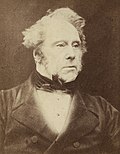The topic of this article
may not meet Wikipedia's notability guideline for events .
Please help to demonstrate the notability of the topic by citing reliable secondary sources that are independent of the topic and provide significant coverage of it beyond a mere trivial mention. If notability cannot be shown, the article is likely to be merged, redirected, or deleted.
Find sources: "1857 United Kingdom general election in Ireland" – news · newspapers · books · scholar · JSTOR (June 2023) ( Learn how and when to remove this message )

